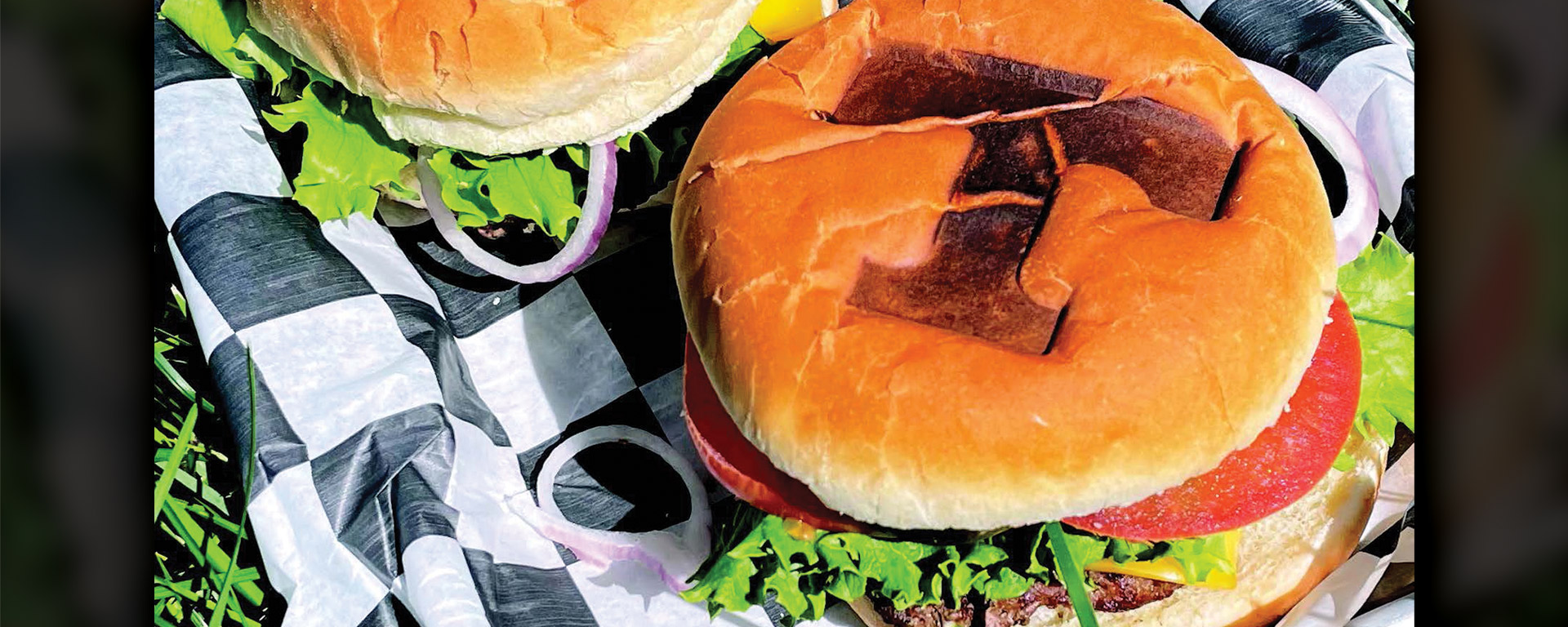Grass-fed UT beef. Organic vegetables raised by UT Institute of Agriculture students. Tennessee wine and cheese created through partnerships with local businesses. Ice cream made and sold by UT faculty and students.
It’s a feast that’s homemade in a very university sense of the word.
UTIA has become increasingly involved in producing or partnering with area farmers and businesses to produce UT-labeled foods.
But these edible endeavors are more than a way for the university to tout its brand. UT foods promote research that improves agricultural and food production efforts, provides experiential learning opportunities for students, raises funds for scholarships and student programs, and provides glimpses into the ways the university supports the state’s agricultural and agritourism industries.
Where’s the Beef?
Since 2021, the university’s Northeast Tennessee AgResearch and Education Center in Greeneville has been providing beef to UT’s Knoxville campus.
Justin McKinney, director of the AgResearch and Education Center, worked with Aramark and Sysco Corp. to supply the campus.
“In the new dining hall, probably close to 75 percent of the beef burgers served are UT beef,” says J. Craig Fincher, assistant regional culinary director for Aramark. “The beef is phenomenal. It’s a very good grass-fed beef. It’s very lean without being dry. And it’s local.”
Although beef is one of Tennessee’s top agriculture commodities, cattle farming is a complex industry that often involves shipping animals from state to state for finishing (raising from maturity to harvest size of 1,200-1,400 pounds) and for processing.
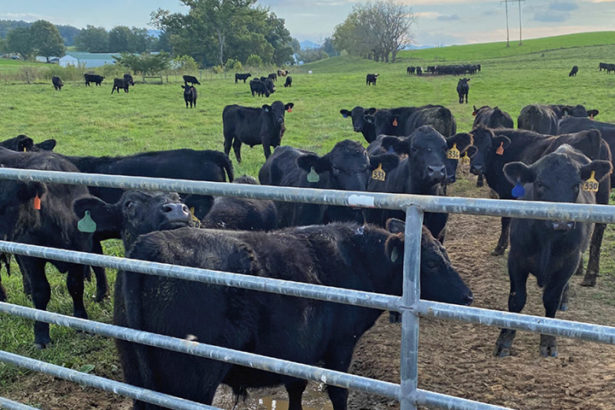
The AgResearch and Education Center—which provides faculty and students with research opportunities in animal, plant and food science as well as entomology and plant pathology and also hires a handful of student interns each year—is a stocker operation, which means it purchases calves and raises them until harvest. They develop up to 300 beef cattle each year. Processing is done elsewhere for now.
McKinney says the goal is to create a sustainable model that can be used by other beef farmers. The goal would be to have cattle born, raised and harvested within a 150-mile radius of where the meat is sold.
Locally sourced beef is a more reliable and safer product, and the decreased shipping reduces the industry’s carbon footprint.
“This type of program can help resolve supply-chain problems and help strengthen our food security,” he says.
Eat Your Veggies!
Each spring, summer and fall, UT student interns raise organic vegetables to sell to the public through the VOL Supported Ag (VSA) program.
This year, VSA sold 90 shares at $700 each (or four monthly installments of $180). For 20 weeks, starting in late May or early June, shareholders get a half bushel of organic produce grown at the UT Organic Crops Unit off John Sevier Highway in South Knoxville. Money raised goes back into the program to buy seeds, pay the interns and defray other program costs.
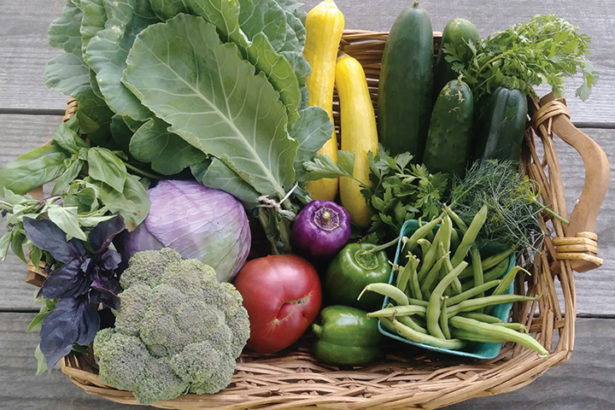
“The VSA is a great experiential learning tool for the students,” says Professor Annette Wszelaki, a vegetable specialist in the Department of Plant Sciences. “The internship teaches the students all of the work that goes into running a small farm, including business planning and management, vegetable and small-fruit planning and production, and direct marketing, as well as the rewards of growing food for others.”
The effort began in 2009, when Wszelaki and a former colleague recruited five students to tend 2 acres at the UT Organic Crops Unit and set up a one-booth farmers market to sell the produce.
“From there it grew into a more traditional farmers market with other growers, crafters, food trucks, music and special events in UT Gardens,” she says.
Then, in 2013, to make it more self-sustaining, the program evolved into a community-supported agriculture program where there’s a relationship between growers and members or shareholders. That first year, the program sold 10 shares. The program has grown steadily and took a big jump during the pandemic, when people were reluctant to go into grocery stores.
Student interns take two classes in the spring—Organic and Sustainable Crop Production and a hands-on independent study where they begin the farm work.
“When classes are done in May, they work on the farm full time until classes start back up in August,” Wszelaki says.
They grow strawberries, lettuce, beets, carrots, kale, cabbage, green onions, broccoli, turnips, radishes, onions, garlic, tomatoes, pepper, eggplant, squash, collards, fresh herbs and more.
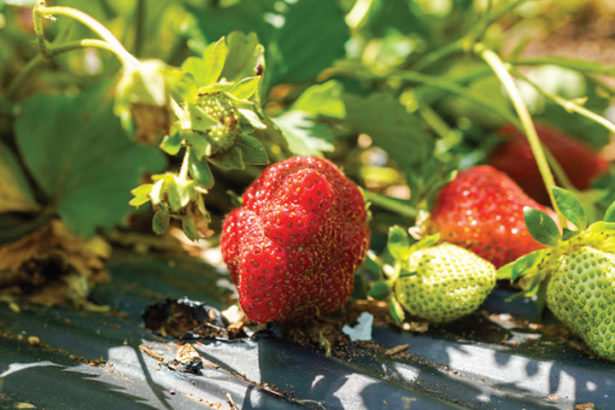
From late May through fall, the students spend Mondays and Thursdays harvesting crops and packing boxes for shareholders. Photos of the boxes are posted on VSA’s Instagram account.
“The idea is that a half-bushel will supply vegetables to feed an average family of four for a week,” Wszelaki says.
She hopes the program stimulates interest in beginning farming and preserving farmland.
“We’ve had music majors and English majors, a lot of sustainability majors and Ag campus majors,” she says, adding that some of the student interns have gone on to run their own farms, join the Peace Corps, or have found jobs with the Natural Resources Conservation Service or UT Extension.
Vino Volunteers
UTIA has long worked with the Tennessee Farm Winegrowers Alliance on viticulture initiatives, so when the opportunity arose for the alliance and UT to partner on UT-labeled wines, it was a natural fit.
To promote the state’s wine industry and infuse additional dollars into student scholarships, “we teamed with the alliance to select wineries across the state to sell UT-branded Tennessee wines though the Vino Volunteer Program,” says Keith Barber, UTIA vice chancellor of advancement.
While UT doesn’t offer a viticulture major, students can take classes to learn the very basics of grape growing as well
as other agritourism and farm beverage initiatives. David Lockwood, a fruit- and nut-crops specialist with UT Extension, leads a study-abroad trip to Italy each May for students who want to learn more about growing grapes and making wine. Administered by the University of Georgia, the trip is open to students from other universities. Several UT students have gone through the years.
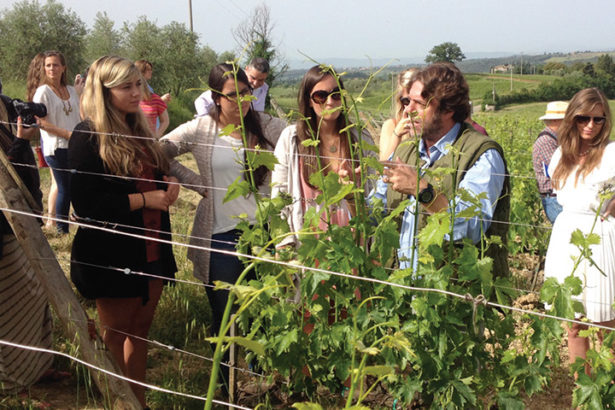
Endowment-funded scholarships are available to help UT students secure internships and other hands-on experiences: The Troy and Connie Perrin Viticulture Enhancement Endowment was the first of its kind in this discipline; the Peter Howard Endowment for Wine and Agritourism was established by donors in 2020 to honor the late Peter Howard, an entrepreneur who began a winery in Humboldt.
UT’s first Vino Volunteer partner was Mountain Valley Winery in Pigeon Forge, one of the largest and oldest wineries in the state.
Jonathan Ball, chief operating officer of Mountain Valley, says the winery’s owner, Phillip Don Collier, is a 1974 UT Knoxville alumnus and a big proponent of the Tennessee wine industry.
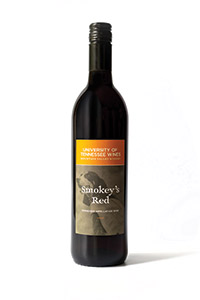
Mountain Valley doesn’t grow its own grapes; rather, it purchases about a million pounds of grapes each year from 40-plus Tennessee vineyards. To be labeled as a Tennessee wine, at least 75 percent of the grapes used to make it must have been grown in the state.
That first year, Mountain Valley produced three UT wines: Volunteer Orange and White (a white), Smokey’s Red and Tailgate Sangria.
“The program worked great the first year with Mountain Valley, but all parties knew from the beginning that we wanted to move production around to various vineyards,” Barber says.
The alliance chose two other wineries to participate this year.
Crown Winery in Humboldt, which is the winery Howard started, created a white wine called Tennessee’s Beacon Bright. Arrington Vineyards, a Nashville area winery co-owned by country music star Kix Brooks, introduced a dry red wine named Morgan Hall Red. Mountain Valley reprised its Tailgate Sangria. And Apple Barn Cider House in Sevierville created Sweet Traditions, a cider made of red muscadines blended with apple cider.
“Wines and ciders created in Tennessee are unique and are highly regarded,” Barber says.
Although UT does not sell the wines directly, they can be purchased online (utwines.com) and at the wineries.
The partner wineries get enough money from the sales of the UT wines to cover their production costs plus a modest profit.
The university collects part of the sale proceeds to support students via the Howard Endowment. So far, the Vino Volunteer program has raised about $25,000 for the endowment.
Smile and Say ‘All Vol Cheese’
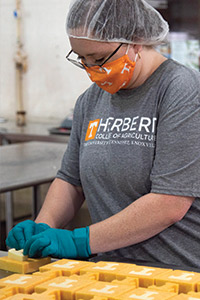
In 2015, the Department of Food Science partnered with Sweetwater Valley Farm to produce All Vol Cheese to give students opportunities to learn about making and selling cheese.
All Vol Cheese “is not a moneymaking opportunity,” says John Harrison (Knoxville ’81), owner of Sweetwater Valley Farm. Proceeds go back into the food-science program to benefit students.
Harrison and his wife, Celia, purchased an interest in the dairy farm in 1987, became its sole owners in 1992 and began producing cheese in 1998. The farm has become a local leader in agritourism, welcoming visitors to the farm to see the cheesemaking operation and visit the onsite shop.
Having received advice from UT along the way, Harrison said he was pleased to work on All Vol Cheese. He says students who visit the farm focus on cheese but can apply what they learn to all types of food manufacturing and processing businesses.
Now, seven years after it debuted, All Vol Cheese produces five varieties: Torchbearer Jalapeno Cheddar, Smokey’s Smoked Gouda, Game Day Sharp Cheddar, Checkerboard Mild Cheddar and Power T Cheese (orange and white mild cheddar molded into a Power T design).
The farm’s shop sells the Power T Cheese; all of the varieties are marketed and sold by UT. Walk-in sales are available year-round from the food science department; shipped orders are available during the holidays and other peak seasons via the All Vol Cheese website https://allvolcheese.tennessee.edu/.
Don’t Forget Dessert
Soon, a UT-branded meal can be topped off with a scoop of ice cream or orange Herbert Sherbet.
A combined effort of the Institute of Agriculture, the Herbert College of Agriculture and the College of Education, Health, and Human Sciences, the new UT Creamery is expected to open in the next few months. It will include an ice cream-making facility in the Food Sciences Building on River Drive as well as a 1,500-square-foot ice cream shop and boutique in the UT Culinary Institute and Creamery building at 2712 Neyland Drive (the old UT Visitors Center).
The Creamery is a great comeback story.
The UT Cooperative Creamery opened in 1915 to train students and encourage interest in dairying. It operated until 1989, when economic constraints and changing consumer demands forced it to close. In its heyday, it purchased raw dairy products from local farms and produced ice cream, cheese, cottage cheese, milk and butter, which it sold on site and delivered to customers.
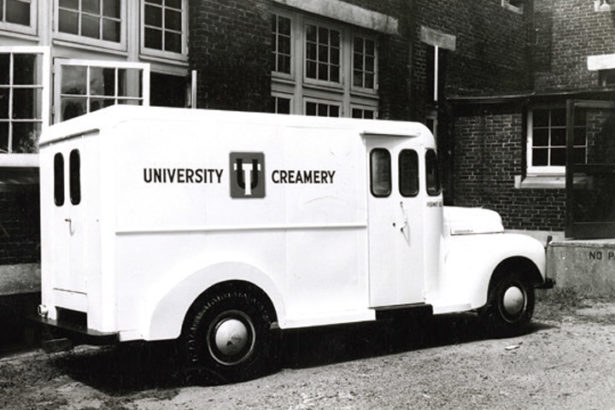
For years, many wanted to see the Creamery return. The stumbling block was money.
Then, last year, UT alumnae Peggy Smith and Sue Conley (Knoxville ’75) of California—creators of the renowned Cowgirl Creamery brand—agreed to provide the seed money.
Creamery Manager Nathan Miller (Knoxville ’06, ’09) says the Creamery will buy Weigel’s ice cream base mix made from milk from Tennessee dairies, including UT’s dairy at the East Tennessee AgResearch and Education Center-Little River Animal and Environmental Unit in Walland in Blount County.
The Creamery will produce one batch at a time, several batches a day. It will make vanilla, chocolate and strawberry, as well as some specialty flavors.
The retail shop will sell ice cream by the dish, cone and pint. It also will sell UT- and Creamery-themed clothing, drinkware and tailgating supplies, along with some commemorative and collectible items designed by Rocky Top Institute student fellows.
Bon Appetit!
From beef to organic vegetables, Tennessee wine and cheese, and ice cream, food has become a means for UT to promote itself, fund student programs, encourage experiential learning and give back to the region by supporting local farmers, value-added enterprises and the agritourism industry.
Caula Beyl, dean of the Herbert College of Agriculture, says these ventures fit well into the university’s land-grant mission.
“As an essential part of the land-grant mission, the Herbert College is dedicated to providing the best education possible for students who will support a thriving agriculture industry in Tennessee, work with state farmers and learn how to feed and nourish the world,” she says. “The best way to do this is to teach not only cutting-edge science but have students actually experience firsthand what it means to grow, harvest, process and market the commodities that we value in Tennessee.”
UT’s Center for Profitable Agriculture Helps Farmers with Value-Added Efforts
On any given day, Megan Leffew may advise a vegetable farmer interested in making and selling salsa, a livestock producer considering marketing meat or a fruit farmer wanting to offer pick-your-own blueberries.
Leffew is a marketing specialist with the Center for Profitable Agriculture, a partnership between UTIA and the Tennessee Farm Bureau Federation that assists farmers considering diversifying their operations with what the industry calls value-added agricultural enterprises.
“It’s such a fulfilling job. We do something different every day and work to help Tennessee farm families,” she says.
The center is based at the William P. Ridley 4-H Center in Columbia, but staff work with farmers across the state. Specialists offer educational workshops, webinars and tours; develop publications; and provide personal consultation via emails, phone calls and farm visits.
“Our specialists help farmers analyze, develop and expand many types of value-added agriculture, direct marketing and agritourism opportunities ranging from bottling milk and making cheese, to selling cut-flower bouquets, to distilling grains into spirits, to composting and bagging farm waste,” Center Director Rob Holland Jr. (Martin ’91, Knoxville ’93) says. “Demand for assistance in these sorts of enterprises has been growing over time, and we are getting more requests for information and program participation than ever before.”
Part of the reason is consumer demand.
While demand for local food and farm experiences has been growing for some time, the pandemic drove a growing number of consumers directly to farmers for local food and beverages, plants and flowers, and farm experiences.
In addition, Tennessee is seeing an influx of residents moving to more rural areas and people moving in from other states. Some are buying land and thinking about new business opportunities related to raising food crops, farm animals, or flowers or offering on-farm lodging or events.
At the same time, many long-time farmers are looking for ways to make their businesses more profitable. Some are just trying to survive.
Enter the Center for Profitable Agriculture.
There are regulations and licensing requirements, insurance needs and safety issues to consider. Farmers need to find a market niche, calculate their expenses vs. potential profits and make sure they are up the challenge of dealing with the public in this new way. They need to get equipped to accept various forms of payment, including credit cards and perhaps even Electronic Benefits Transfer (EBT). A written business plan can be vital.
“When we offer educational programs and work with farmers who are just starting out in value-added enterprises, we try to help them understand questions they need to be asking of themselves and about the market to help them assess their potential for success. We also try to point them to resources that are available through UT Extension, state agencies and producer organizations,” says Leffew.
Next year will mark the center’s 25th year of helping Tennessee farmers analyze and develop value-added agriculture enterprises.
“We are proud of the work we have done to impact Tennessee agriculture thus far and look forward to working with farmers and industry partners to make the most of future challenges and opportunities,” Holland says.
